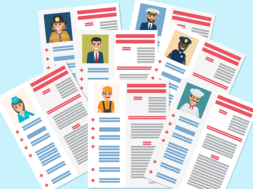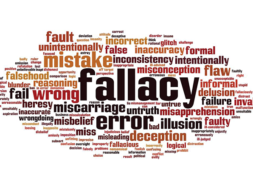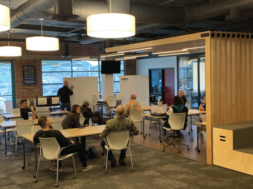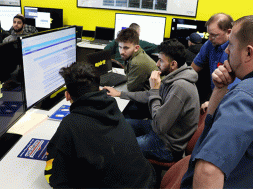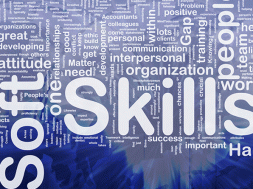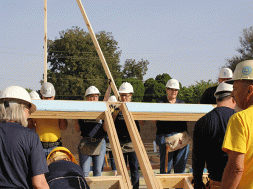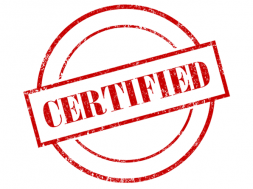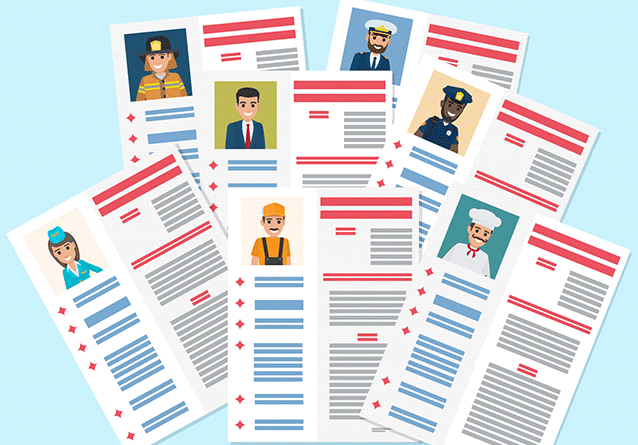
What Innovative Career Service Departments Learned From COVID-19
By Micaela Alpers, President – Education Division, Career TEAM
As the threat of COVID-19 has slowly started to subside and campuses resume face-to-face operations across the country, it is important to pause and reflect on what career colleges have learned about placement operations in the midst of the chaos. Without a doubt, the pandemic pushed career colleges to the brink of fast-paced innovation; as a result of their creativity, many institutions have discovered new ways of engaging students and employers while gaining operational efficiencies in the process. Efficiencies that are not only cost savers, but necessary to meet student and employer demands in our ever-evolving post-pandemic environment.
Many institutions are reporting that students who were originally enrolled in brick-and-mortar programs have become accustomed to virtual learning and the flexibility it provides. Hybrid and online course delivery has proven to be effective models for students that had not previously considered remote education; career education leadership teams should expect that trend to stay. Remote access to career services is no different. It is now the expectation of students that they can not only gain access to career services from their mobile devices, laptops, and tablets, but also on their own time.
This expectation has pushed effective institutions toward adopting technology platforms that enable on-demand career coaching services without requiring round-the-clock staffing models.
Historically, career services departments have offered one-on-one coaching for time-intensive department responsibilities such as resume writing, mock interviews, and job search activities. Innovative institutions have adopted online tools that provide comparable levels of service and offer students the 24/7 access they now expect.
While on-demand tools are an excellent solution to meet student expectations and create scale for career services, synchronous engagement is still an important component of a successful career services strategy. However, as schools are no longer bound by campus geography, proactive institutions are putting thoughtful consideration into the facilitation and deployment of these engagements. By creating a centralized workshop delivery model schools deploy their best subject matter experts to students across the system, allowing students to develop relationships with peers from various communities and to maximize efficiency by hosting multiple campuses in a single engagement. Virtual workshop delivery is successful when workshop materials and discussion prompts are adapted for remote delivery and facilitators are trained on remote engagement strategies and effective use of their delivery platforms such as Zoom, Microsoft Teams, etc. Career colleges have invested in training faculty for this transition and can easily repurpose training resources for career services staff members as well.
By moving to a high-tech/high-touch approach for student preparation, career services teams have been able to reevaluate staffing models and redeploy resources to provide a greater return on investment. Similar to students, employers now have an expectation about how partner institutions will work with them. These expectations differ from historically localized models and require leadership teams to reimagine their target contacts and overall strategy effective employer engagement. Hiring managers of larger organizations often work remotely or from centralized office locations. They may work in different time zones or operate with flexible schedules all together. Their workdays are structured accordingly and consequently they screen candidates differently. Emerging hiring trends, particularly for regional and national employers, include opportunities for online and on-demand candidate searching, job board integration, personality assessments integrated into their applicant tracking systems, the desire for virtual hiring events, and a point of contact that represents all institutional brands, campuses and programs. Knowing this, an effective employer engagement specialist does not need to be tethered to a specific campus location. They should operate with a consultative business development mindset and be equipped with digital tools that allow their recruiting partners to engage in a 21st century way.
Successful institutions are adjusting to these demands by adopting an Employer Centric career services model. Employer centric career services models treat the employer as the customer of their institution and adopt a recruitment mindset. Using this model, employer needs are evaluated regularly, and a candidate pipeline is established accordingly. This reverse engineered approach takes into consideration upcoming graduation dates in order to develop a candidate pipeline.
Institutions that embrace employer feedback and allow it to inform curriculum changes and the development of employer specific programs, can also create revenue generating partnerships outside of traditional Title IV programs.
In order for institutions to meet the demands of new employer expectations, they must have an effective platform to showcases graduate resumes at a minimum, and ideally graduate profiles that include virtual hiring opportunities such as virtual interviews. Regional and national institutions must develop a seamless process for campus level student and staff activity to flow into their systems approach.
Once student preparation and employer engagement are functioning under one career services platform, proactive institutions integrate their career services management system and student information systems to develop additional points automation. Opportunities for automation include push notifications to students around resume development timelines, scheduling of mock interviews, and certifications that are triggered at pre-determined points along the student journey. In addition, there are many paperwork heavy compliance components of the career services process that have been digitized and pushed automatically based on student status or enrollment in specific courses. As an example, externship timesheet calculations and clinical site signoffs that were once handled by paper and pencil, can live within the student’s digital course shell and push notifications can be sent to site supervisors on a weekly schedule. Once approved, timesheet and skills checklist data are transferred back to the system of record eliminating the need for staff to calculate paper timesheet data and enter records one by one. As another example, career services authorization forms, waivers, and placement documentation can be automatically sent to students when they achieve pending graduate status in the student information system. Career services advisors are then able to follow up and record attainment from one system dashboard as opposed to housing documents in one system and manually updating another. By automating so many historically manual and time intensive processes, incredible efficiencies are realized and the hiring profile of a successful career services employee shifts from a compliance documentation focus to true employer engagement specialists.
As colleges have adapted their career services models to meet the emerging needs of the students and employers we serve, the need for visibility and reporting dashboards that allow administrators to track student, employer and staff activity at the system, campus, and program levels become a critical component of the placement program. Career colleges have consistently utilized CRM like technology for marketing and admissions functions of their institutions. A similar approach must be taken with career services to ensure the efficacy of their hybrid career services models are fully implemented and optimized. Key performance indicators around student activity, employer outreach, and staff engagement must be established and reporting dashboards configured accordingly.
In addition to department visibility, these dashboards simultaneously serve as excellent leadership tools to manage remote and hybrid career services teams.
Career services leaders need accurate real time reports as a mechanism to hold staff accountable for departmental responsibilities. Work from home and work from anywhere policies can do a great deal for staff retention and flexibility in the workplace, but some employees have adapted more seamlessly than others. Successful department leaders meet with front line staff for daily standup meetings, ideally first thing in the morning. The purpose of these brief meetings is to review the previous day’s performance, review progress against goals for the week, acknowledge team members that are exceeding expectations and motivate staff to persist when no one is watching.
As we enter a new chapter in career college operations, institutions will continue to adapt and develop their post COVID-19 placement strategies. Ideally, leadership will evaluate their current programs from a 30,000-foot view and from that elevation make strategic decisions that consider the entire customer journey. A customer journey that, in this case, is not only about students, but employers and staff members from multiple departments that are also impacted. An effective career services strategy integrates the student, employer, and staff experience. When all components of the placement process are broken down, we must consider how student preparation, employer engagement, and staff compliance can be achieved with a career services management system that serves as the wheel with many spokes. When leadership gives thoughtful consideration to a cohesive and streamlined approach to placement, student outcomes improve, employers become institutional partners, and operations are optimized for ultimate success.
 MICAELA ALPERS, as President of Career TEAM’s Education Division, brings a background in higher education, coaching, and career development to the organization. Micaela strongly believes that education is a gateway to empowerment, confidence, and most of all – choice! As a result, what excites her the most about her role is sharing Career Team’s 20 + years of Workforce Development experience with partner institutions and, ultimately, with graduates. Prior to CTL, she served as National Director of Sales for McGraw Hill Education. Micaela completed the Accomplishment Coaching leadership and coaches training program in 2013 and she is also a certified trainer in the Aha! Process, Bridges Out Of Poverty program. Micaela is a Cum Laude graduate from San Diego State University with a BA in International Business, and she lives in Denver CO.
MICAELA ALPERS, as President of Career TEAM’s Education Division, brings a background in higher education, coaching, and career development to the organization. Micaela strongly believes that education is a gateway to empowerment, confidence, and most of all – choice! As a result, what excites her the most about her role is sharing Career Team’s 20 + years of Workforce Development experience with partner institutions and, ultimately, with graduates. Prior to CTL, she served as National Director of Sales for McGraw Hill Education. Micaela completed the Accomplishment Coaching leadership and coaches training program in 2013 and she is also a certified trainer in the Aha! Process, Bridges Out Of Poverty program. Micaela is a Cum Laude graduate from San Diego State University with a BA in International Business, and she lives in Denver CO.
Contact Information: Micaela Alpers // President, Education Division // Career TEAM, LLC // 619-559-8134 // micaela@careerteam.com // careerteam.com // https://www.linkedin.com/in/micaelaalpers//
